NURSING MISC
Marshalltown Community College
Page 4 out of 45 results
Sort by
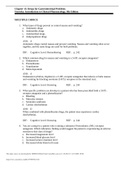
-
NURSING MISCc13.rtf Latest 2022 complete questions & answers explained.
- Exam (elaborations) • 7 pages • 2022
-
- $8.49
- + learn more
Chapter 13: Drugs for Gastrointestinal Problems Vislosky: Introduction to Clinical Pharmacology, 9th Edition MULTIPLE CHOICE 1. What types of drugs prevent or control nausea and vomiting? a. Antiemetic drugs b. Antimotility drugs c. Antidiarrheal drugs d. Ant propulsion drugs ANS: A Antiemetic drugs control nausea and prevent vomiting. Nausea and vomiting often occur together, and the same drugs are used for both problems. DIF: Cognitive Level: Remembering REF: p. 242 2. Which common...
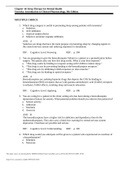
-
Chapter 10: Drug Therapy for Mental Health Visovsky: Introduction to Clinical Pharmacology, 9th Edition
- Exam (elaborations) • 8 pages • 2022
-
- $8.49
- + learn more
Drug Therapy for Mental Health Visovsky: Introduction to Clinical Pharmacology, 9th Edition MULTIPLE CHOICE 1. Which drug category is useful in promoting sleep among patients with insomnia? a. Sedatives b. ACE inhibitors c. Atypical antipsychotics d. Selective serotonin reuptake inhibitors ANS: A Sedatives are drugs that have the main purpose of promoting sleep by changing signals in the central nervous system and reducing responses to stimulation. DIF: Cognitive Level: Knowing REF: p...
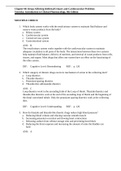
-
Chapter 08: Drugs Affecting theRenal/Urinary and Cardiovascular Problems Visovsky: Introduction to Clinical Pharmacology, 9th Edition
- Exam (elaborations) • 12 pages • 2022
-
- $8.49
- + learn more
1. Which body system works with the renal/urinary system to maintain fluid balance and remove waste products from the body? a. Biliary system b. Cardiovascular system c. Central nervous system d. Gastrointestinal system ANS: B The renal/urinary system works together with the cardiovascular system to maintain adequate circulation to all parts of the body. The interactions between these two systems help maintain fluid balance, delivery of nutrients, and removal of waste products from cell...
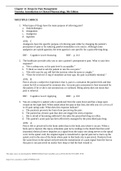
-
Chapter 11: Drugs for Pain Management Visovsky: Introduction to Clinical Pharmacology, 9th Edition
- Case • 6 pages • 2022
-
- $8.49
- + learn more
1. What types of drugs have the main purpose of relieving pain? a. Anticholinergics b. Antagonists c. Analgesics d. Agonists ANS: C Analgesics have the specific purpose of relieving pain either by changing the patient’s perception of pain or by reducing painful stimulation at its source. Although some analgesics are opioid agonists, the term agonist is not specific for a pain-relieving drug. DIF: Cognitive Level: Knowing REF: p. 213 2. The healthcare provider asks you to rate a patie...
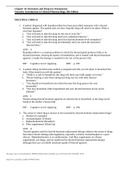
-
Chapter 16: Hormones and Drugs for Osteoporosis Visovsky: Introduction to Clinical Pharmacology, 9th Edition
- Judgments • 9 pages • 2022
-
- $8.49
- + learn more
1. A patient diagnosed with hypothyroidism has been prescribed treatment with a thyroid hormone agonist. The patient asks you how long this drug will need to be taken. What is your best response? a. “You will need to take this drug for the rest of your life.” b. “You will need to take this drug until your symptoms improve.” c. “You will need to take this drug until your thyroid hormone level normalizes.” d. “You will need to take this drug incrementally until you reach the ma...
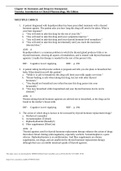
-
Chapter 16: Hormones and Drugs for Osteoporosis Visovsky: Introduction to Clinical Pharmacology, 9th Edition
- Exam (elaborations) • 9 pages • 2022
-
- $8.49
- + learn more
1. A patient diagnosed with hypothyroidism has been prescribed treatment with a thyroid hormone agonist. The patient asks you how long this drug will need to be taken. What is your best response? a. “You will need to take this drug for the rest of your life.” b. “You will need to take this drug until your symptoms improve.” c. “You will need to take this drug until your thyroid hormone level normalizes.” d. “You will need to take this drug incrementally until you reach the ma...
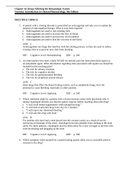
-
Chapter 14: Drugs Affecting the Hematologic System Visovsky: Introduction to Clinical Pharmacology, 9th Edition
- Exam (elaborations) • 10 pages • 2022
-
- $8.49
- + learn more
1. A patient with a clotting disorder is prescribed an anticoagulant and asks you to explain the purpose of anticoagulant therapy. What is your best response? a. Anticoagulants are used to lyse existing clots. b. Anticoagulants are used to increase the flow of blood. c. Anticoagulants are used to prevent new clot formation. d. Anticoagulants are used to thin the viscosity of the blood. ANS: C Anticoagulants are drugs that interfere with the clotting process, so they are used to reduce ex...
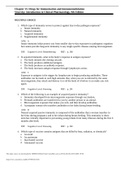
-
Chapter 15: Drugs for Immunization and ImmunomodulationVisovsky: Introduction to Clinical Pharmacology, 9th Edition
- Exam (elaborations) • 6 pages • 2022
-
- $8.49
- + learn more
1. Which type of immunity serves to protect against day-to-day pathogen exposure? a. Innate immunity b. Natural immunity c. Acquired immunity d. Supplemental immunity ANS: A Innate immunity helps protect you from smaller day-to-day exposures to pathogenic organism but cannot provide long-term immunity to any single specific disease-causing microorganism. DIF: Cognitive Level: Remembering REF: p. 280 2. In acquired immunity, what is the body’s response to antigen exposure? a. The body...
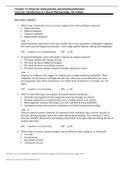
-
Chapter 15: Drugs for Immunization and Immunomodulation Visovsky: Introduction to Clinical Pharmacology, 9th Edition
- Exam (elaborations) • 6 pages • 2022
-
- $8.49
- + learn more
1. Which type of immunity serves to protect against day-to-day pathogen exposure? a. Innate immunity b. Natural immunity c. Acquired immunity d. Supplemental immunity ANS: A Innate immunity helps protect you from smaller day-to-day exposures to pathogenic organism but cannot provide long-term immunity to any single specific disease-causing microorganism. DIF: Cognitive Level: Remembering REF: p. 280 2. In acquired immunity, what is the body’s response to antigen exposure? a. The body...
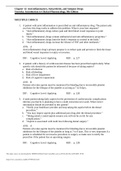
-
Chapter 12: Anti-inflammatory, Antiarthritis, and Antigout Drugs Visovsky: Introduction to Clinical
- Exam (elaborations) • 9 pages • 2022
-
- $8.49
- + learn more
1. A patient with joint inflammation is prescribed an anti-inflammatory drug. The patient asks you how this drug works to address this problem. What is your best response? a. “Anti-inflammatory drugs reduce pain and limit blood vessel responses to joint injury.” b. “Anti-inflammatory drugs contain antibacterial and anti-inflammatory properties.” c. “Anti-inflammatory drugs limit the body’s response to cortisol in the body.” d. “Anti-inflammatory drugs increase the release o...

That summary you just bought made someone very happy. Also get paid weekly? Sell your study resources on Stuvia! Discover all about earning on Stuvia


